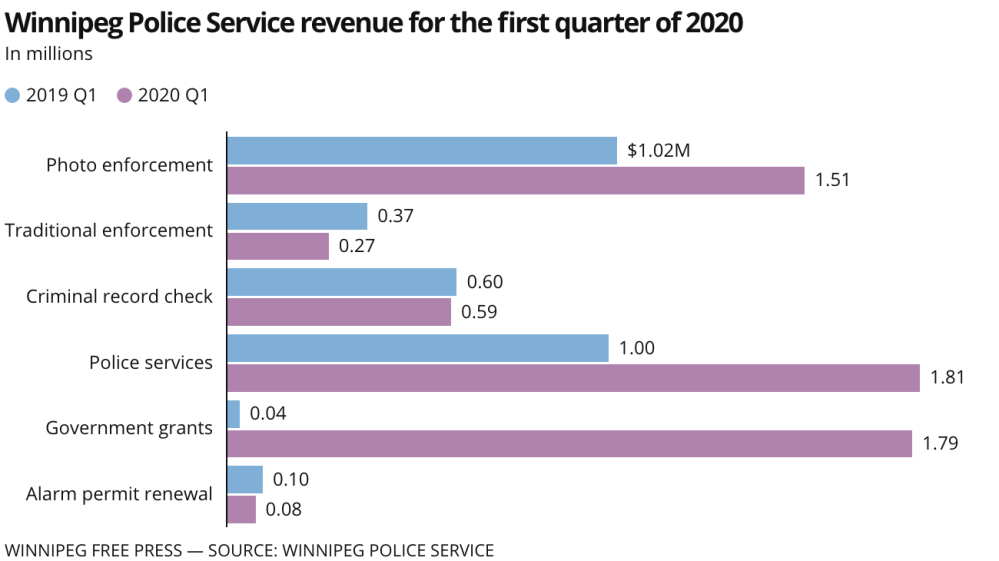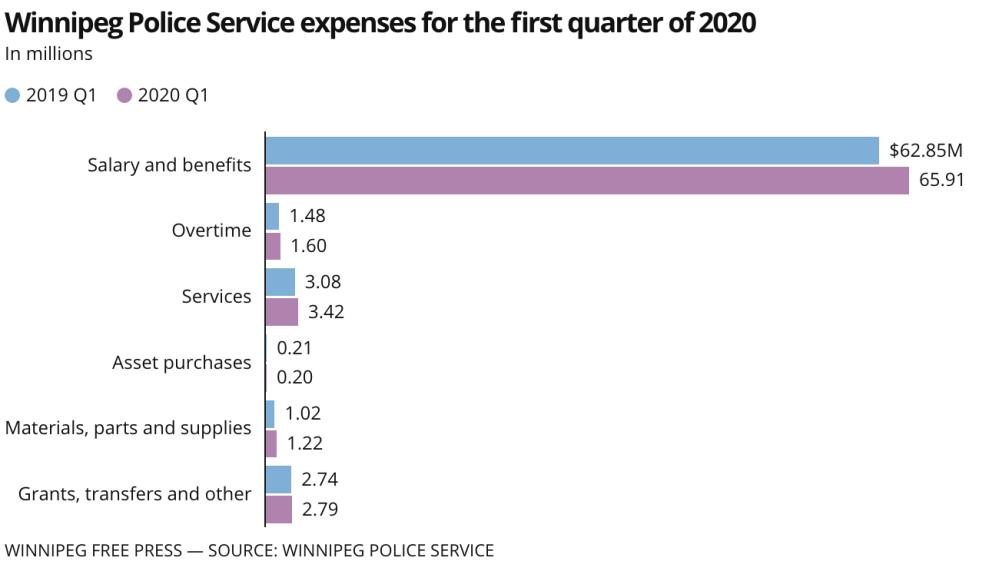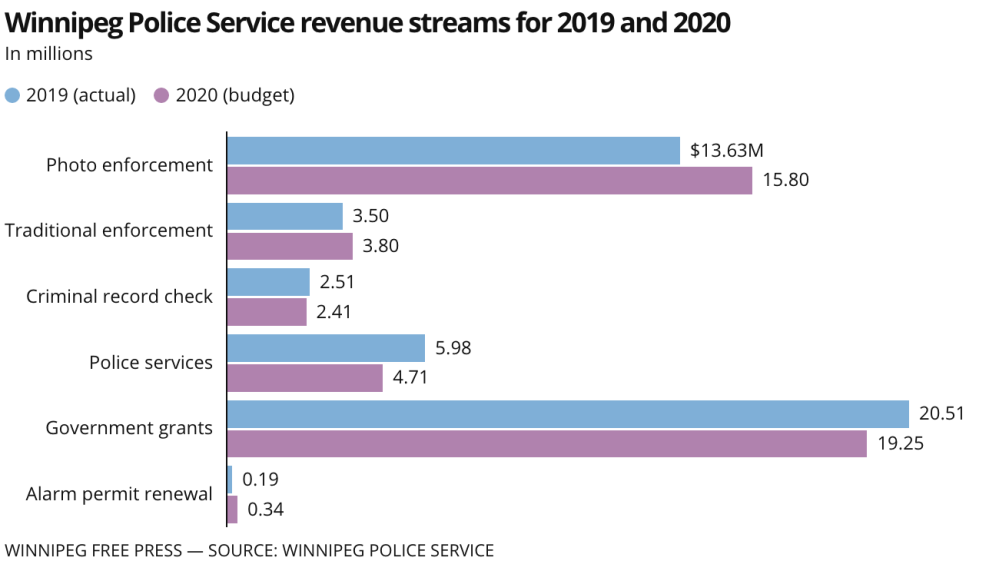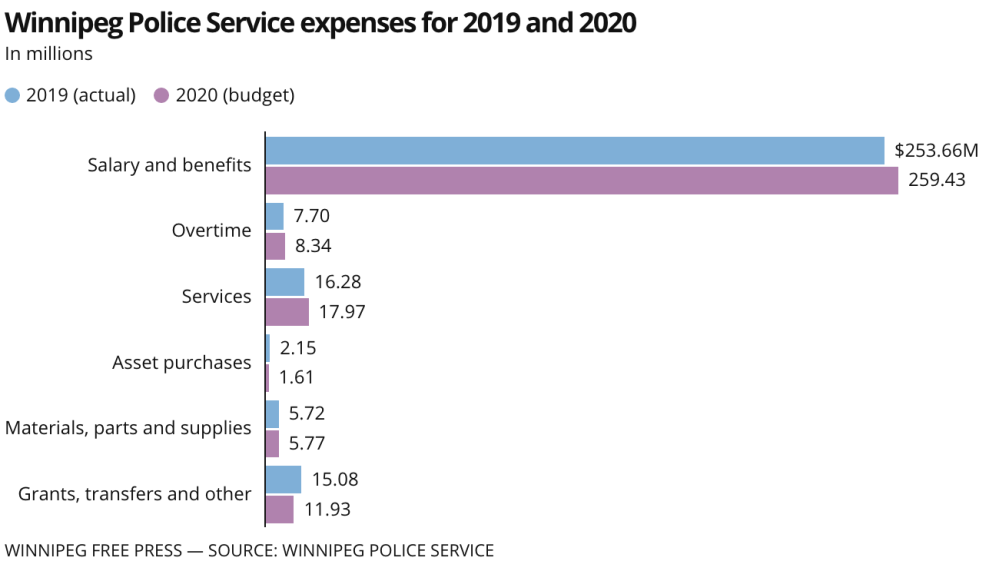Pandemic-reduced photo radar haul puts $6.9-M squeeze on police budget
Read this article for free:
or
Already have an account? Log in here »
To continue reading, please subscribe:
Monthly Digital Subscription
$19 $0 for the first 4 weeks*
- Enjoy unlimited reading on winnipegfreepress.com
- Read the E-Edition, our digital replica newspaper
- Access News Break, our award-winning app
- Play interactive puzzles
*No charge for 4 weeks then billed as $19 every four weeks (new subscribers and qualified returning subscribers only). Cancel anytime.
Read unlimited articles for free today:
or
Already have an account? Log in here »
Hey there, time traveller!
This article was published 01/06/2020 (1424 days ago), so information in it may no longer be current.
The Winnipeg Police Service is now offering a bleaker financial outlook this year, including a drop in photo radar revenue during the pandemic.
The WPS expects its total expenses will climb $5.6 million beyond what its 2020 budget calls for, while revenue drops by $7.9 million, adding up to an overall $13.5-million shortfall.
While photo radar revenue was actually up during the first quarter of the year, police now expect to collect $6.9 million less with those tickets by the end of the year.
Traditional traffic enforcement is expected to earn about $2 million less this year.
Winnipeg Police Service has released several reports on 2019 operations, which note the following highlights:
– Police made $3 million worth of cash and drug seizures, which included 170.3 kilograms of illicit drugs in 2019.
– A total of 50,513 property crimes were reported last year.
– The WPS communications centre managed 648,247 calls in 2019.
– The police professional standards unit received 49 complaints, sparking 29 investigations last year. The investigations included probes on the following allegations: assault (2), neglect of duty (2), theft (1) and “discreditable conduct” (8). There were no allegations of police bias.
– Police chased vehicles in pursuits 45 times in 2019, down from 84 in 2018. Last year, that led to 13 collisions and four injuries.
– The WPS armoured response vehicle (ARV) was deployed 38 times in 2019, including its use at 30 firearms-related calls, one “armed-and-barricaded” incident, a kidnapping, three domestic/family disputes and a hostage incident.
– The ARV was also present at six community engagement events last year.
– Police attended 231,668 calls for service in 2019, including 857 incidents that involved use of force or a weapon being shown.
– Five police-involved shootings took place in 2019 and two people died from their injuries.
A new report notes revenues in that and several other categories “may be further impacted by COVID-19.”
The chairperson of the Winnipeg Police Board said he fears that could force police to consider cuts that impact public safety.
“You’re going to have to make adjustments, whether it’s layoffs or looking at other items that are going to have to go,” said Coun. Kevin Klein (Charleswood-Tuxedo-Westwood).
The financial hit also includes a reversal of the city’s unilateral changes to the police pension plan, since council expected to save $6 million through those now-cancelled changes this year.
Council recently scrapped that plan after an arbitrator ruled it did not have the power to impose the changes on its own.
In November 2019, WPS Chief Danny Smyth said the service would need to eliminate 34 officer and 25 cadet positions within three years to meet previous council-imposed 2020-2023 budget targets.
On Tuesday, Smyth said there are no immediate plans to cut police positions due to the current year-end budget predictions.
“At this point, I have no indication I’ll be considering any layoffs. The budget is a concern and we will work with the (police) board and the city administration to address that in the coming years,” he said.
Klein said he’s also concerned that the police must depend on photo radar revenue to support their budget, when they’re also tasked with deterring speeding.
“I find it inappropriate to budget a service on a specific number of fines. That should be budgeted somewhere else, so the illusion of the police having a (ticket) quota isn’t there,” he said.
The councillor suggested photo radar revenue could fund road-safety initiatives instead.
Klein said he worries police may be unfairly blamed for losses linked to the attempt to change the police pension plan, even though that was pursued by council.
City council’s finance chairperson, Coun. Scott Gillingham, said police, like many other city departments, are facing some unforeseen financial pressures.
“A reduction in photo enforcement and traditional traffic enforcement is inevitable, given the fact that there are fewer cars on the road due to COVID-19. There are fewer people driving to work every day, there are fewer people travelling, as Winnipeggers have been abiding by the provincial health orders to stay home,” said Gillingham (St. James).
The city’s pandemic financial plan notes that council expects to use part of its rainy-day fund to address budget shortfalls, which could assist police, said Gillingham.
However, he noted each department is also expected to cut costs.
Joyanne.pursaga@freepress.mb.ca
Twitter: @joyanne_pursaga

Joyanne Pursaga
Reporter
Born and raised in Winnipeg, Joyanne loves to tell the stories of this city, especially when politics is involved. Joyanne became the city hall reporter for the Winnipeg Free Press in early 2020.
History
Updated on Tuesday, June 2, 2020 9:03 PM CDT: Fixes typo.











